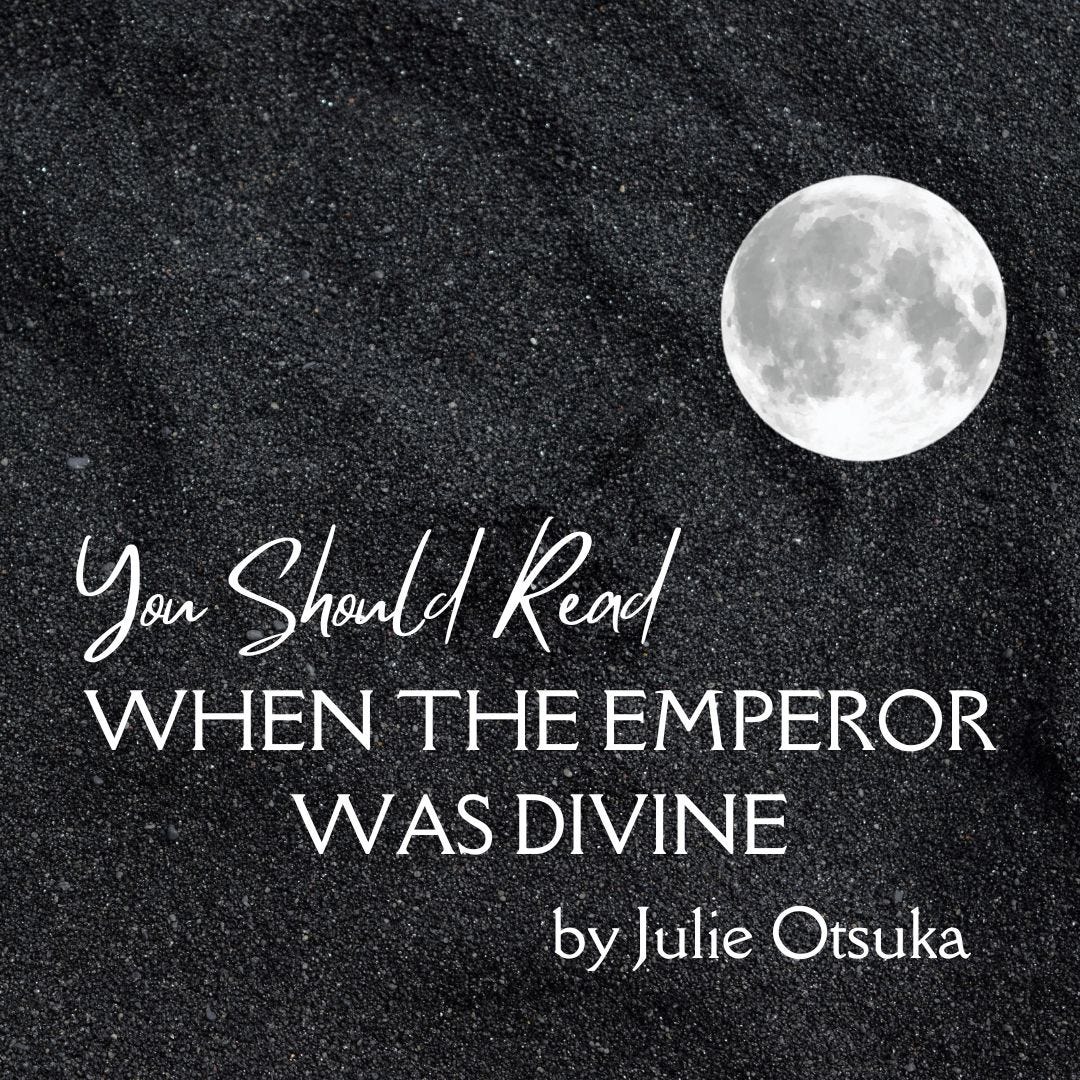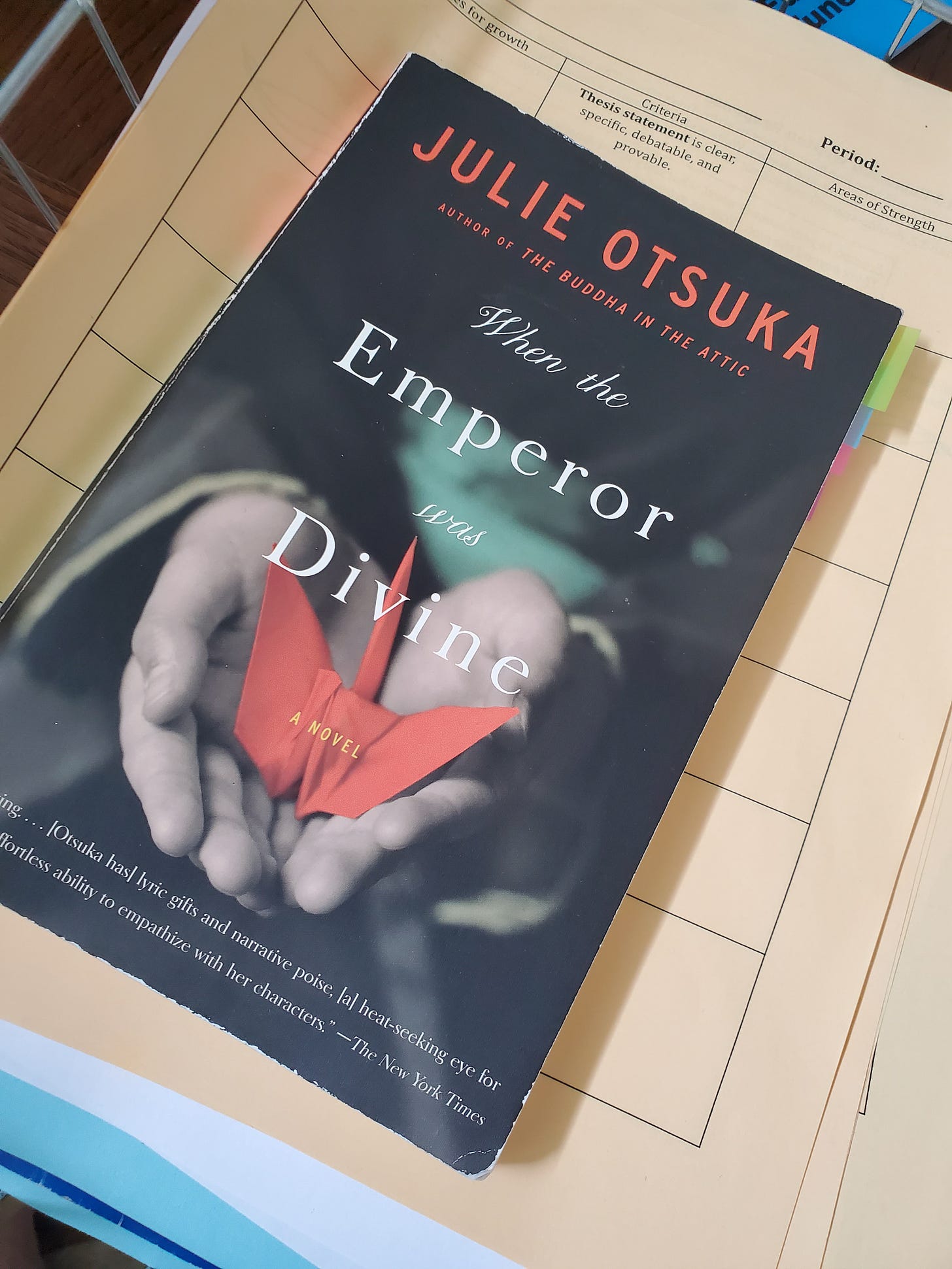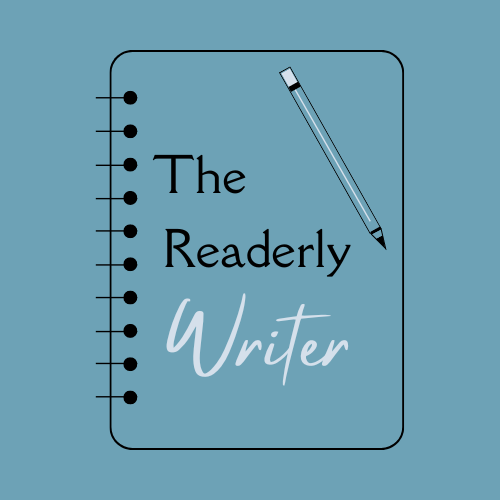You Should Read WHEN THE EMPEROR WAS DIVINE by Julie Otsuka
Not all books are as inviting; not all writers are as welcoming.
Here it is: The book I recommend more than any other.
Are you my friend? Then I’ve likely told you to read this book because I love it and hope you will, too.
A writer? You’ll marvel at how the author chooses details for maximum impact, and then you’ll practice doing the same in your own writing. Also: The pacing! The point-of-view shifts! The clarity of the language! So much fodder for inspiration if you’re facing a creativity block.
A teacher? I’m telling you, it’s time to mix up the “canon”! Invite some new and diverse voices into your curriculum. You won’t regret it. I swapped Of Mice and Men for this book (but you could try this one, too).
My student? Yeah, okay, fine, you should read it because I’m assigning it, but also because you’ll learn so much about how to read closely, wonder about characters’ motivations, and draw inferences about everything that goes unspoken.
My dental hygienist? I would tell you to read this book also, if it were possible to say something while your hands are in my mouth.1
When the Emperor was Divine tells the story of an unnamed Japanese American family that is relocated to a camp in the Utah desert during WWII. If you missed the LA Times’ decision last year to replace the word “internment” with “incarceration,” you should read this op-ed by Teresa Watanabe first. In the words of executive editor Kevin Merida, the Times altered their style guide as part of “[their] our commitment as an institution to better represent the communities [they] serve.” In 1942, the Times supported Executive Order 9066, which allowed the US government to send 120,000 Japanese Americans to detention camps. The newspaper’s recent language change is part of its ongoing effort toward reconciliation.
Otsuka’s novel opens with a woman in Berkeley who sees an evacuation order posted:
“The sign had appeared overnight. On billboards and trees and the backs of the bus-stop benches. It hung in the window of Woolworth’s. It hung by the entrance to the YMCA. It was stapled to the door of the municipal court and nailed, at eye level, to every telephone pole along University Avenue.”
Distracted by the sign, the woman forgets to return her library book and sets about preparing her children for their forced removal. Her daughter is ten, and her son is seven. Her husband has already been arrested and detained elsewhere. After staying at an old horse racetrack for the summer, the woman, her son, and her daughter travel to the desert by train. There, they await both news of their husband/father and the end of the war. Upon their return to Berkeley, the children notice that “where [their] mother’s rosebush had once stood there [is] only a clump of dead weeds.” Both their home and their community are changed, and they must decide who they are. The children vow to assimilate:
“We would listen to their music. We would dress just like they did. We would change our names to sound more like theirs. And if our mother called out to us on the street by our real names we would turn away and pretend not to know her. We would never be mistaken for the enemy again!” (114)
A summary never does a book justice—especially not a book this intricately bound by symbols. Otsuka masterfully selects everyday objects to take on emotional weight. Because many of the objects (a watch, a hat, a scarf, a pair of shoes) are domestic, they call out the inhumane conditions in the camp. She also includes a number of motifs, or recurring elements that may or may not be concrete symbols, to illustrate the family’s hardship. Water is one such motif. In the first chapter, the woman deals with a leaky roof; in the third, she longs, “just once . . . to look out the window and see the sea” (94). From her vantage point in the dusty camp, heavy rain no longer seems like an burden. The juxtaposition of abundant water with a lack of water underscores her total removal from her previous life.
Sleep and dreams also run throughout the story. The girl dreams of her father. The boy dreams of Emperor Hirohito. Their mother confesses, “Sometimes I don’t know if I’m awake or asleep” (94). Dreams become the only safe places for the characters to question their future. Dreams pull them through each day, even when they don’t feel like trying.
My favorite aspect of When the Emperor was Divine is Otsuka’s decision to shift the point-of-view within each chapter. If you want to study the tricky magic that is voice, this is the book to do it. The first three chapters are written in a close third-person: first from the woman’s perspective, then the girl’s, and then the son’s. Each chapter takes place in a different location, so we change settings along with narrative voices. The woman’s voice is cool and reserved, cracking only when her children are in bed. The girl’s voice is childishly, heartbreakingly vain. Her younger brother’s voice is fragmented and dreamy, full of yearning for a childhood to which he’ll never return. My favorite chapter is the fourth, which switches to a first-person plural voice of the children. The closing chapter moves into a first-person singular voice for a haunting monologue.
When the Emperor was Divine is a brilliant little novel. Deceptively short and straightforward, it encourages you to dig through its layers and find your own interpretation. Not all books are as inviting as When the Emperor was Divine; not all writers are as welcoming as Otsuka. After the war, the children choose to believe “that somewhere out there, in some stranger’s backyard, [their] mother’s rosebush [is] blossoming madly, wildly, pressing one perfect red flower after another out into the late afternoon light.” I get the sense Otsuka views her book like a rosebush. As readers we may be strangers to her, but we can tend to her story nonetheless. Careful, attentive reading will keep the family’s story blossoming each time someone new opens this book.
That next person should be you—and if it is, I’d love to know what you think about it in the comments.
Bonus: If You Teach
As much as I love reading When the Emperor was Divine, I also love teaching it. Over the summer I collected five years of lessons and activities into a single unit. I started it with my sophomores last week, but it’s adaptable for any grade in high school. If you’re interested, my resources for this novel are 20% off through August 28:
Belonging in America: Unit Plan for When the Emperor was Divine: I’ve refined this unit over many years, and I hope you love it! It includes 65 editable slides with links to ALL resources & clear instructions; a detailed 5-page unit plan; a before-during-after reading guide with prompts for students; a character analysis essay with brainstorming and rubric; 2 optional extension activities (“I Am Not” speech and Symbolism Pictionary); and a 23-slide lesson for teaching students to analyze themes rather than topics.
“I Am Not” One-Minute Speech inspired by When the Emperor was Divine: This can be used without reading/teaching the book, and it’s a great community-building activity for early in the school year. Included in the full unit plan
Symbolism Pictionary for When the Emperor was Divine: Practice interpreting symbols with this fun, no-prep game! You can play in small groups or as a class. Included in the full unit plan
I’d love to hear what books you love to teach in the comments!
Apologies to all dentists and dental hygienists. I know that it’s your job! And I know you’re helping me out! But I really, really hate going to the dentist. I hate going to the dentist about as much as I love this book.






